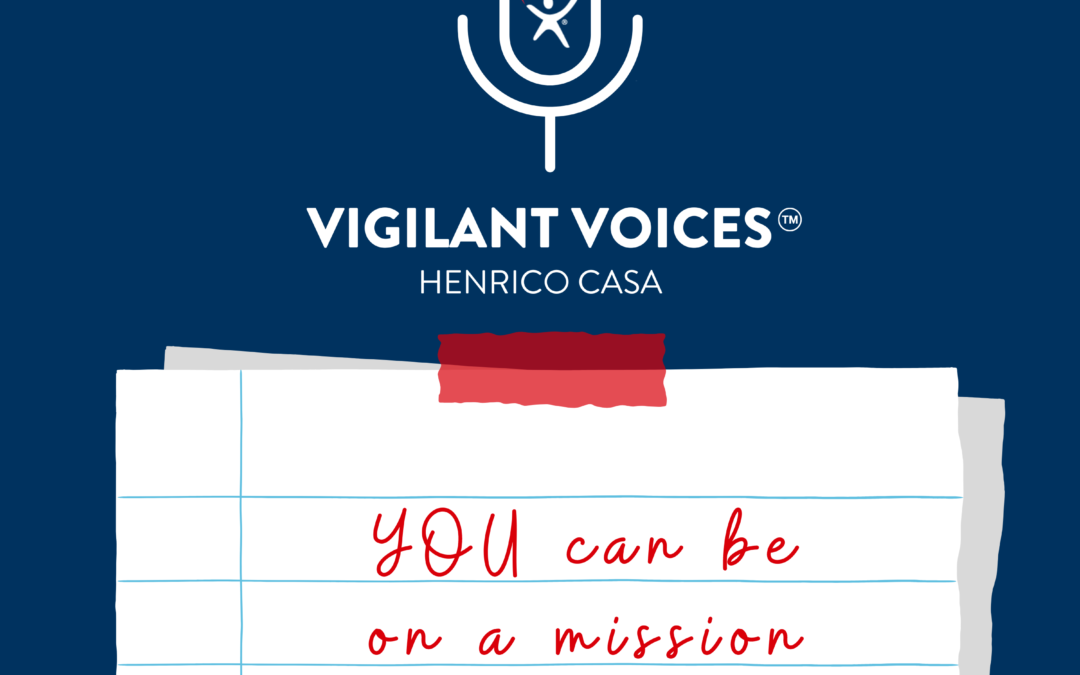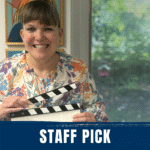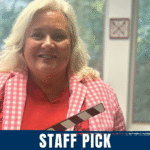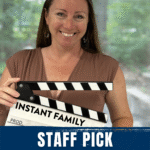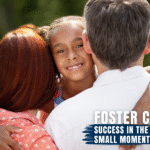
Listen to Episode 20 of the Vigilant Voices™ podcast, YOU Can Be on a Mission.
Jeannine Panzera: We just want to start off by saying “Happy New Year!”
Kristin Blalock: Yes. Great things to come in 2024.
J: How are we in 2024, by the way?
K: It’s kind of crazy. But before we look ahead, it’s also always nice to look back, to reflect a bit on the previous year.
J: Yes. And of course, thinking on 2023, that’s the year that we launched this Vigilant Voices™ podcast.
K: That’s right. The year that will go down in history, right? But seriously, we’re so happy to have you on this journey with us because when we all KNOW about the challenges facing children and families, we can better ensure NO child faces continued abuse, neglect or trauma.
J: And what we want to talk about today is a little bit of reflection about what drives us at Henrico CASA – our mission, vision, values – and in doing so, our hope is that it opens all of us up to consider our personal mission, vision and values.
K: Oh, I love that. Because when we remember these basics, it really helps guide our decisions and how we want to spend our time and resources in the new year. What do we believe? What’s most important to us? What impact do we want to have? If we don’t stop, truly stop, and pause to formulate these thoughts, we can kind of just wander through life and miss opportunities.
J: Right. And I think that’s why the new year is a wonderful time for that reflection and just resolutions. Let’s go into the year with a goal and something maybe that we’re working towards.
K: Yeah, definitely. And at CASA, we’re always working towards the best interest of each individual child that we serve. And I have a great example of this in today’s CASA case story about a child we’ll call Michael. CASA became involved with Michael and his family after he came to school with physical injuries, including a black eye and a big gash on his head. The school called Child Protective Services,
J: which they should mandated reporters.
K: Definitely. And in an emergency hearing at court, Michael and his sister were removed from their home and placed with their aunt. And this space, being away from their parents, who were at that time being investigated for child abuse, gave the children the immediate safety that they needed. And that is right about when their CASA showed up with a soccer ball and an interest in getting to know them.
J: We usually see that showing up with an activity and something to do with the kids is really always a win. But, yeah, thanks for sharing this story, and I’m sure we’ll learn a little bit more about Michael. But just like all of the cases that we’re currently working know, our goal is that we want these children to end up in a safe and stable home.
K: Definitely. After all, that is our vision at Henrico CASA. Our vision is for all children to live in safe, stable homes.
J: Right. And I think having that vision and knowing we aren’t quite there yet as a community is why we exist. As we’ve said before, in the nonprofit field, when we’re working with all these vulnerable populations, if we shut our doors, that means that we have solved the issue.
K: Right. So that’s a win, but we’re not there yet.
J: We want to make that vision a reality. And so in our mission, what we are doing to work towards that ideal state, is advocating in court for a child’s best interest and educating the community concerning the needs of abused and neglected children.
K: Right. And, listener, we are assuming that you share our vision, that, like us, you believe every child deserves safety, security, and love.
J: Yes. And our hope is that as you also reflect on goals for the new year, that maybe you spend a little bit of time thinking about what you could be doing, whether that’s something big or something small, to stand up and speak up for the well being of kids.
K: Yeah. Which we know can be overwhelming. Right. We’ve all got our own lives, our own personal goals on our mind. How do we also tackle this bigger vision of helping children?
J: Agreed. And I think the reality is it can feel overwhelming when it’s like, there’s so much to do, how do we do it? You know, at our team at CASA, I think we found that formulating core values helps us in then carrying out our mission and working towards that.
K: We like to say that our values are like the guiding principles that help us do our work on a day to day basis.
J: Right. They’re our organizational beliefs. They direct what we do and how to go about doing it. In the same way that we’re each driven by our personal beliefs.
K: Right. Like how we interact with people, what we do and say the ins and outs of each day are affected by our personal values.
J: Yes. And really, that’s the same thing. Or it should be with organizational values. So one of the cool things that I find about CASA’s organizational values and that I really do love is that everyone is involved with our mission. Whether that’s volunteers, our staff, our board members, donors. Sure, they might be applied a little bit differently, but these values should mean something for each of these different groups and people.
K: Yeah. So true. And we saw that at our annual advocate event that we held last November. We spent a lot of time discussing our values and how we each apply them to our work. And we absolutely loved seeing our advocates ponder and discuss what the values mean to them and how they apply them in each of their individual cases.
J: Yeah. I still think about that event and how wonderful it was, but it was such a meaningful exercise, too, because we are all different. But then we also have so many unifying values, and I think it’s important for us to remember that, too.
K: Yeah. And we all have unique experiences and personalities, so we clearly apply values in different ways.
J: Yes. So, listener, we wanted to share the same exercise in some ways we did with our advocates, with YOU. So walk you through our values and ways that we could interpret and apply those values.
K: And by doing this, we hope that we can all kind of grab nuggets of ways we could incorporate these values into our overriding vision with how we interact with children, how we cherish them, support them, help them.
J: Yes. So let’s start with our first value that’s about family. So one of our core values is family preservation and reunification, because we know that children grow up best in their families. Of course, if it is safe.
K: That is the key. If being with family can be achieved safely, we’re all for it.
J: Absolutely. But unfortunately, we know that sometimes it’s not. And we’ve shared examples of our cases and children who may end up in a different type of placement. But our advocates then, are always having to walk this balance between a child’s safety and then the goal of keeping a family together if at all possible.
K: Practically, how do they do that? How do they apply this core value of family to the work? Luckily, we know the answer because they told us.
J: Yes. So when they were thinking about this together and reflecting here were a couple of ways that they can apply this and interpret this.
- And so the first, which I thought was really neat, is helping parents understand what the child’s needs are and then connecting them with services to support those needs. So that’s all about family resources.
- Next, really thinking about what we mean by the term safety. That is such a broad term, but what does that mean and then require for that specific child that they’re advocating for in that particular moment?
- The last one, I think, is really neat and very well said it’s don’t let perfect be the enemy of good.
K: Oh, yeah. There’s wisdom there. Those are actually all great. I’ve also heard our advocates say that they must keep kind of a big picture mindset.
J: Right. Because there’s just so many factors and details and issues to consider. So you’ve got to stay really big picture focused when you’re working on the best interest for a child. And I think that’s just important. It’s a dual balance of the big picture and then that specific need of that family or that child.
J: The next value on our list is collaboration.
K: And we all know, especially our advocates, that there’s so much value in collaboration, but it can also bring challenges.
J: It can. And so we had our advocates reflect on this, and they put together a list of what they consider to be sort of key elements to collaboration in their work.
- First was trust. Right. So trusting one another.
- Maintaining honesty. So similar.
- In those conversations, be comfortable asking specific questions.
- Also bring humility to the table, which, again, I think is such a wise reflection.
- And then the last one was seeking ways to encourage that open communication. So building those relationships enough to be able to just have that honest, open conversation.
K: Just getting it started is sometimes the biggest hurdle. And I think I would add what I heard people say was to be open to collaborating with as many people as possible, because sometimes the best partner to work with is kind of unexpected. Someone you didn’t see coming.
J: Yeah, that’s so true. You didn’t even necessarily know that. So I personally, truly believe that collaboration allows us to have an even greater impact on the children we serve. So it’s just really important that we incorporate that in our day to day work. Right. And so then the other value that I’d love to chat a little bit about today is inclusion, which is sometimes easier said than done.
K: I think we all want to include everyone, but we can be unaware of our unconscious biases.
J: Right. Which is why we work really hard with our advocates to uncover and address our biases or social stereotypes, which, again, we all have. That’s normal. It’s based on how we grew up and the social groups that we were around. But we really work to talk about this and think about it before we have our advocates start working with families.
K: Yeah. And we all know at CASA that is an ongoing process because our brains are always trying to organize, like, social worlds.We categorize to understand something, to allow our brains to process. But that is the core of what leads to these biases.
J: Exactly. So when we asked our advocates how they work to address their biases and how they’re kind of constantly juggling and balancing some of these issues, they said:
- Ask questions from a genuine curiosity. So be curious and want to understand.
- Focus on seeing individuals as individuals and not their identity. So not based on their race or gender or anything like that.
- Ask questions by listening and then observing, too. So we can learn so much by our observations and by active listening.
- Question our assumptions, which is good. That kind of forces us out of our, maybe out of what we know, be aware of our personal reactions to things.
K: Oh, yeah. You have to be really self aware.
J: Ask why am I reacting this way? And then if I feel uncomfortable, why is that? What makes us feel uncomfortable?
K: That whole list is fantastic to reflect on and just kind of check ourselves because we don’t want to project our own thoughts and beliefs onto others, especially when we’re trying to serve someone.
J: Right. And in order to prevent that from happening, we do need a level of self awareness. Absolutely. And we have to then be self aware and then willing to prioritize a child’s needs, regardless of maybe where we’re coming from, and then really think about how can we best meet those needs as a team, regardless of differences, and move forward.
K: And that’s the perfect lead in to the end of today’s CASA case story, because Michael’s advocate applied all of these values in his interactions with Michael and Michael’s family. He definitely collaborated with others, and he connected the family with the support they needed to be able to stay together long term. So in doing so, he respected their cultural beliefs, while at the same time being unwavering in prioritizing the children’s safety, which, again, it can be a hard balance. But he found that line and prioritized Michael’s safety. But most important to Michael, this advocate just showed up. He played, he talked, he listened, he bonded. And as sad as this advocate is to be saying goodbye to Michael, him being removed from the case means that Michael doesn’t need him anymore. Now Michael and his family have everything they need to thrive, and this family has been reunited, and that’s such a success in such a way. J: We were there for that piece of Michael’s journey. Yeah. And so, listener, our goal today was to give ourselves a little nudge, right? A reminder to reflect on our values at the start of a new year.
K: Yeah, because our values guide our decisions and our actions. And if we want to do great things in 2024, we must start by reconnecting with our values.
J: Exactly. So, listener, our call to action today for you is to pick one of the values we discussed today that is aligned with your personal values. Could be family, collaboration, or inclusion. And just a little challenge to make sure that your goals or resolutions for the year can relate and check back to that underlying principle.
K: And doing so will help you stay on track.
J: We’re doing the same thing in our lives at CASA, but it will help you stay on track with what’s most important to you. And we know that the well being of children is most definitely important to you.

